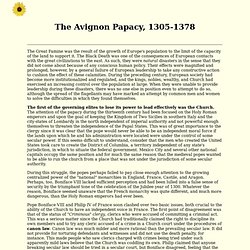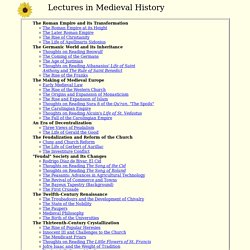

List of common misconceptions. From Wikipedia, the free encyclopedia This incomplete list is not intended to be exhaustive.

This list corrects erroneous beliefs that are currently widely held about notable topics. Each misconception and the corresponding facts have been discussed in published literature. Note that each entry is formatted as a correction; the misconceptions themselves are implied rather than stated. The Avignon Papacy 1305-1378. The Great Famine was the result of the growth of Europe's population to the limit of the capacity of the land to support it.

The Black Death was one of the consequences of European contacts with the great civilizations to the east. As such, they were natural disasters in the sense that they did not come about because of any conscious human policy. Their effects were magnified and prolonged, however, by a general failure of European leadership to take any constructive action to cushion the effect of these calamities.
During the preceding century, European society had become more institutionalized and regulated, and the kings, nobles, wealthy, and Church had exercised an increasing control over the population at large. Medieval History Lectures: Dr. Lynn H. Nelson. Please take into consideration the purpose and audience for which the lecture notes listed above were written.

For a good many years, I taught a three-credit-hour freshman survey entitled Introduction to Medieval History to enrollments of room-size - generally three hundred students. During those years, the University of Kansas maintained an open enrollment policy in which all graduates from accredited Kansas high schools were admitted to the University. Since the only history courses required by the State of Kansas at the secondary level were in American History, students enrolling for this course varied widely in their knowledge of the European past.
Consequently, my lectures were both basic and episodic, concentrating on major events and topics that would prepare the students for further enrollments in Humanities courses and attempting to demonstrate that the study of History could be both useful and enjoyable.